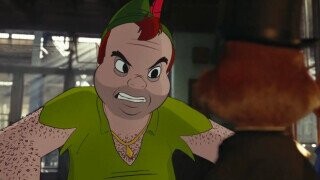‘Chip 'n Dale: Rescue Rangers’ Sidesteps Disney’s Real-Life Villainy

Disney’s revisionist meta-reboot Chip ‘n Dale: Rescue Rangers hit their streaming service this past Friday, thrilling fans of the ‘80s cartoon and really thrilling fans of the rejected CGI Sonic the Hedgehog, the Pete Best of 21st century animated characters.
Directed by Akiva Schaffer, of The Lonely Island and Hot Rod fame, the movie is mostly a lot of fun; it takes the central premise of Who Framed Roger Rabbit (cartoons living side-by-side with humans) and uses its own cameo-packed excess as a commentary on our current state of pop-culture overkill. But its allegorical impulses also take the movie to some pretty dark places …
Don't Miss
Most conspicuously, the main villain of the story is “Sweet Pete,” literally the Toon that played Peter Pan, whose life fell apart after he hit puberty and Disney kicked him to the curb.
Which sure seems like a deep-cut reference to the story of Bobby Driscoll, the voice actor and character model for the lead role of Disney’s 1953 Peter Pan. As we’ve mentioned before, young Driscoll was dropped by Disney after developing acne, which seemingly caused his life to go off the rails, until he eventually died of a “drug-induced heart attack” while homeless at the age of 31. This wasn’t a totally isolated incident, either; Disney also treated the voice actress behind Snow White like total garbage, similarly ruining her career.
Chip ‘n Dale’s Sweet Pete seems like a pretty pointed callback to Driscoll’s tragic story; they even seem to visually reference the late actor’s acne problem.
One could argue that making the movie’s villain a reference to one of the Walt Disney Company’s darkest chapters is an impressively subversive creative decision – not unlike how Tim Burton’s Dumbo remake was ultimately about how soul-crushing it is to work for Disney. But the problem is, the movie turns this real-life victim into a villain, and one who exists only to service a comedic children’s movie that will no doubt bolster the profits of the offending company’s lucrative streaming service.
Plus, Sweet Pete’s plan involves bootlegging cartoon characters – which, in this reality, involves literally kidnapping and torturing Disney’s intellectual properties. This is obviously meant to be somewhat tongue-in-cheek, but again, in a movie filled with meta-commentary, this feels not so great. Why? Because when it comes to copyright issues, it’s Disney that has arguably shown itself to be the most villainous. Disney isn’t fighting off legions of crooks in order to maintain control of their characters; they’re suing the families of comic book creators, makers of edible cake frosting, and in one particularly infamous case from the ‘80s, multiple daycare centers.
So, in retrospect, really any movie in which forces representing the Disney brand heroically battle evil bootleggers run by a symbolic dead child star, is pretty goddamn messed up.
You (yes, you) should follow JM on Twitter!
Top Image: Disney